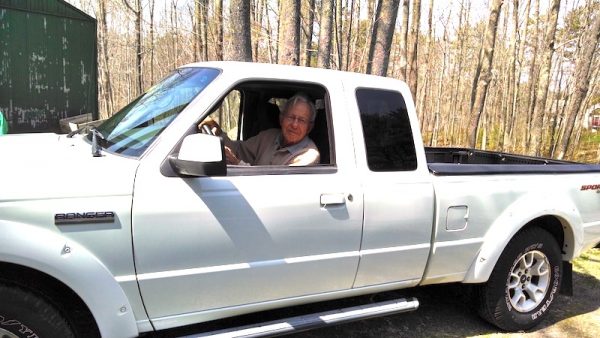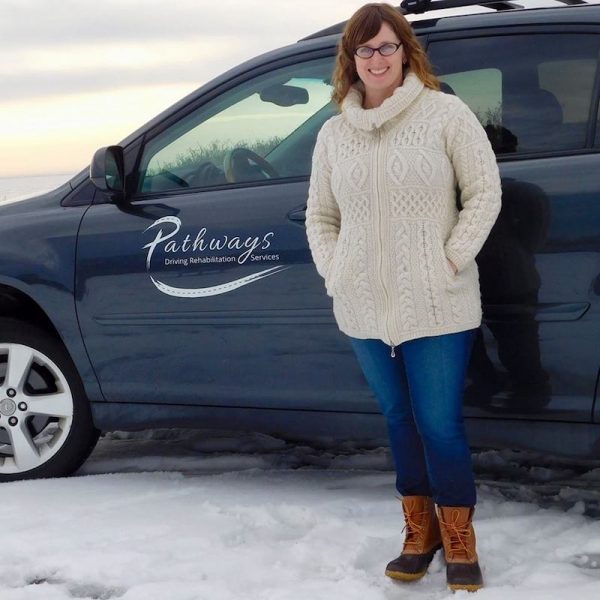At 96, Bill Taylor, who’s a retired doctor, is spry and sharp as a tack — and still driving. He wants to keep driving as long as possible. Heather Shields, who owns Pathways Driving Rehab Services, recently assessed his skills and determined that he was still fit to be behind the wheel, but needed some practice and a few restrictions.
Heather is an occupational therapist who helps a variety of people with their driving skills. Some have had strokes or injuries and may need adaptive equipment, such as hand controls. Others are like Bill and need to restrict their driving or work on strengthening skills. And some are no longer safe to drive at all.
I’m looking at are they at high risk for having an accident? Could they be safe if we limit their driving and just do a lot of education with them? Or are they so unsafe they need to retire from driving? Do they have neuropathy and can’t feel the pedals?
I’ve had people’s feet slipped off the brake and hit the gas pedal when they were with me. They don’t know because they couldn’t feel.
Heather Shields
Her evaluation begins with a conversation that includes family if the concern is that the person may be too old to drive or has been showing signs of possible dementia.
When someone has dementia, it may be obvious to us, but not always to them. If the individual’s insight is poor, they may think they’re better than they actually are. Their families are the ones who are seeing them decline. They are tuned into the subtle and major changes that occur over time. And that’s why I include them in my evaluation.
Heather Shields
A person may insist their memory isn’t as good as it used to be, but it’s not a problem. Only Heather will notice they’re confused about the date or repeating themselves over and over again.
And then the kids will chime in and say, well Dad, remember when the doctor said he really doesn’t want you to driving until you do this test because you had a couple of those accidents.
Heather
She says she can pick up a tremendous amount of information about a person’s cognitive ability in that initial conversation.
If they can’t manage their medications anymore and family has taken it over or they can’t do their finances, those are red flags. It means their ability to pay attention and process things are affected. And then the testing I do confirms it.
She checks their vision and then goes driving with the individual. She has her own set of pedals on the passenger side of her vehicle and she has had to use them.
I have to take them in the car because they think they’re going to be fine. I have to let them make mistakes so that they have evidence about why they’re no longer safe to drive.
Heather
She went driving with Bill several times to observe and assess his skills. And then they had several driving lessons on back roads, city roads, and the turnpike. Sort of a refresher driver’s training course.
It’s easy at any age to get lazy or complacent about the rules of the road. Heather drills it into people that you have to come to a complete stop, look both ways, make sure no one is in the crosswalk, be extra cautious. And Bill realized that although he stayed in his lane, he was a bit of a weaver. Now he uses the white line on the right as a guide.
Bill’s daughter Martha says Heather made her father a more defensive driver, and for that, she’s grateful. She and her sister had tried talking to him about his driving before, but he admits he didn’t really listen.
I’m a denier! They’re telling me what to do all the time and I have to think it over to make sure I know what she’s talking about.
Bill Taylor
He took Heather’s assessment seriously and practices what she taught him. He also agreed to the restrictions she imposed.
No more night driving or driving in rain or snow storms. I was alright with that.
Bill
A lot of elderly people will start noticing things themselves and they self limit their driving. They say, no, I don’t drive at night anymore or I don’t go to Portland anymore, I just drive locally and I only drive when it’s quiet and there’s not a lot of traffic out there. That’s all good. That’s using good judgment.
Heather
When it’s clear the person shouldn’t be driving, Heather is often the one to break the news, relieving family members of what is often an extremely challenging task. But she doesn’t stop there. She helps the family come up with a plan for taking away the car, if necessary and helps them figure out transportation options.
I do a lot of education with family/caregivers about what it means and research transportation alternatives to give them options in their community. Like independent transportation network and other organizations. It can be exhausting having to drive someone around all the time. I also communicate with the doctor and the bureau of motor vehicles.
Heather
For now, Bill Taylor is still driving and following the rules. Heather checks in with him on a monthly basis and he says if she tells him he’s no longer safe to drive, he won’t.




This is a great way to deal with this. We listen much better when family emotions aren’t involved.
Diane, thank you for articulating this story so well!! And thank you for sharing this story with your audience!! This truly is a blessing to older drivers and their family members. I am happy to help in any way possible if any readers have questions about driving, retiring from driving or extending driving years!
And thanks for the link to Pathways Driving Rehab Services at the top of the story. So many of our parents (or gasp us!) do not listen to family but will listen to a professional. Heather will be a great resource!